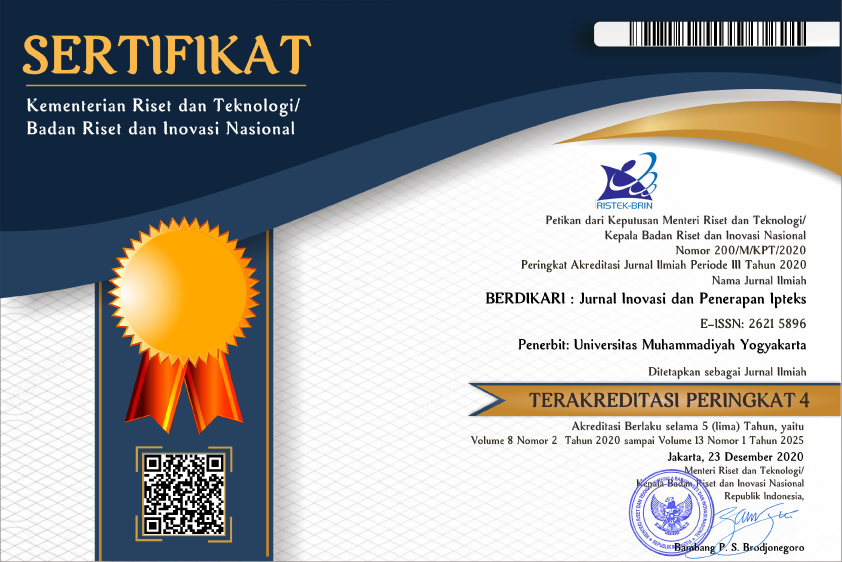Peningkatan Pemahaman Kurikulum 2013 bagi Guru Sekolah Dasar
DOI:
https://doi.org/10.18196/bdr.7270Keywords:
teacher, curriculum 2013, microsoft excel, descriptive gradeAbstract
This community service activity aims at developing skills for elementary school (SD) teachers of Muhammadiyah Sirojuddin in using information technology media, namely Microsoft Excel to process the data of the assessment result to the report in accordance with curriculum 2013. The method used was through information technology training divided into three stages, namely: (1) description making of each grade on the fields of affective, cognitive, and psychomotor; (2) submitting grade of affective, cognitive, and psychomotor fields; (3) converting grade from number to descriptive form. The community service was carried out in six times of meetings with 17 teachers of SD Muhammadiyah Sirojuddin. The result of the service community are 15 teachers are helped in understanding curriculum 2013 and grade conversion process based on Microsoft Excel program. The result of the descriptive grade is the one that will be benefitted by the teachers as data input in the report in accordance with curriculum 2013.
References
Ahmad, S. (2014). Problematika Kurikulum 2013 Dan Kepemimpinan Instruksional Kepala Sekolah. Jurnal Pencerahan, 8(2012), 98–108. https://doi.org/10.13170/JP.8.2.2158
Alawiyah, F. (2014). Kesiapan Guru Dalam Implementasi Kurikulum 2013. Info Singkat Kesejahteraan Sosial - Pusat Pengkajian, Pengolahan Data, Dan Informasi (P3DI), VI(15), 9–12. https://doi.org/10.1016/j.zefq.2017.03.002
Ali, M. (2013). Implementasi Kurikulum Pendidikan Nasional 2013. Jurnal Pedagogi, 2(2), 49–60.
Arikunto, S. (2009). Prosedur Penelitian Pendidikan dan Pengembangan. Jakarta: Rineka Cipta.
Arnidha, Y. (2018). Pendampingan Implementasi Kurikulum 2013 Bagi Guru Sekolah Dasar di Kecamatan Negerikaton Kabupaten Pesawaran Propinsi Lampung. International Journal of Community Service Learning, 2(1), 16. https://doi.org/10.23887/ijcsl.v2i1.12904
Astuti, Y. P., Subhiyakto, E. R., & Adi, P. W. (2019). PENDAMPINGAN GURU – GURU DALAM PEMBUATAN RAPORT KURIKULUM 2013 DI MI MIFTAHUL HIDAYAH GUNUNGPATI SEMARANG. ABDIMASKU, 2(2), 73–78. Retrieved from http://abdimasku.lppm.dinus.ac.id/index.php/jurnalabdimasku/article/view/44/29
Baidhowi, M. R. (2018). Instrumen Penilaian Sikap Sosial (Studi Penilaian Sikap Sosial pada mata pelajaran Fikih di Jurusan Tehnik dan Bisnis Sepeda Motor SMK Muhammadiyah 1 Patuk). EDUDEENA, 2(1). https://doi.org/10.30762/ed.v2i1.518
Gunawan, H., & Triantoro2, A. (2017). Sistem Informasi Pengolahan Rapor Kurikulum 2013. Jurnal Terapan Teknologi Informasi, 1(1), 51–60. https://doi.org/10.21460/jutei.2017.11.6
Gunawan, I., & Palupi, A. R. (2017). Taksonomi BLOOM – Revisi Ranah Kognitif: Kerangka Landasan Untuk Pembelajaran, Pengajaran dan Penilaian. Premiere Educandum : Jurnal Pendidikan Dasar Dan Pembelajaran, 2(2). https://doi.org/10.25273/pe.v2i02.50
Hakim, L. (2017). Analisis Perbedaan Antara Kurikulum KTSP DAN Kurikulum 2013. Jurnal Ilmiah Didaktika, 17(2), 280. https://doi.org/10.22373/jid.v17i2.1644
Kamiludin, K., & Suryaman, M. (2017). Problematika pada pelaksanaan penilaian pembelajaran Kurikulum 2013. Jurnal Prima Edukasia, 5(1), 58. https://doi.org/10.21831/jpe.v5i1.8391
Nurmalasari, R., Dian, R., Wati, P., Puspitasari, P., Diana, W., & Dewi, N. K. (2016). Peran Guru Dalam Implementasi Kurikulum 2013. Jurnal Berkala Program Pascasarjana UM Malang, 722–733. https://doi.org/10.1063/1.3499372
Prastowo, A. (2014). Pemenuhan Kebutuhan Psikologis Peserta Didik SD/MI Melalui Pembelajaran Tematik-Terpadu. Jurnal Pendidikan Sekolah Dasar, 1(1), 1–13. https://doi.org/10.1144/SP290.9
Suparlan. (2012). Tanya Jawab Pengembangan Kurikulum Materi Pembelajaran (ke-2). Jakarta: Bumi Aksara.
Sutrisno. (2015). Penilaian pembelajaran tematik pada kurikulum 2013 di sekolah dasar. Jurnal Sekolah Dasar, 1(1), 12–17. Retrieved from http://journal2.um.ac.id/index.php/sd/article/view/1356
Syamsuddin, S., Wiyono, G., Khilmiyah, A., & Muhammad, M. (2017). Revolusi Mental Guru Pendidikan Agama Islam Dalam Penguatan Karakter Melalui Penerapan Social Emotional Learning (SEL). BERDIKARI : Jurnal Inovasi Dan Penerapan Ipteks, 5(2). https://doi.org/10.18196/bdr.5227
Wiguna, A. (2018). Upaya Mengembangkan Sikap Spiritual Dan Sosial Peserta Didik Berbasis Psikologi Positif Di Sekolah. AL-ASASIYYA: Journal Of Basic Education, 1(2). https://doi.org/10.24269/ajbe.v1i2.684
Wiranto, B. S., & Mardiah, N. (2013). Analisis Kurikulum 2013 Secara Menyeluruh. Pendidikan.
Yubali, A. (2013). Penilaian Autentik Pada Kurikulum 2013. Seminar Nasional Implementasi Kurikulum 2013 . Universitas Pelita Harapan, Karawaci, Tangerang, 742–749.
Yuniarti, B., Fatmaryanti, S. D., & Maftukhin, A. (2014). Pengembangan Instrumen Penilaian Psikomotorik pada Pelaksanaan Praktikum Fisika Siswa Kelas X SMA Negeri 5 Purworejo Tahun Pelajaran 2013/2014. Radiasi, 5(1). Retrieved from http://ejournal.umpwr.ac.id/index.php/radiasi/article/download/1695/1609
Downloads
Published
Issue
Section
License
Copyright
Authors retain copyright and grant BERDIKARI Jurnal Inovasi dan Penerapan IPTEK the right of first publication with the work simultaneously licensed under an Attribution 4.0 International (CC BY 4.0) that allows others to remix, adapt and build upon the work with an acknowledgment of the work's authorship and of the initial publication in BERDIKARI Jurnal Inovasi dan Penerapan IPTEK.
Authors are permitted to copy and redistribute the journal's published version of the work (e.g., post it to an institutional repository or publish it in a book), with an acknowledgment of its initial publication in BERDIKARI Jurnal Inovasi dan Penerapan IPTEK
License
Articles published in the BERDIKARI Jurnal Inovasi dan Penerapan IPTEK) are licensed under an Attribution 4.0 International (CC BY 4.0) license. You are free to:
- Share — copy and redistribute the material in any medium or format.
- Adapt — remix, transform, and build upon the material for any purpose, even commercially.
This license is acceptable for Free Cultural Works. The licensor cannot revoke these freedoms as long as you follow the license terms. Under the following terms:
- Attribution — You must give appropriate credit, provide a link to the license, and indicate if changes were made. You may do so in any reasonable manner, but not in any way that suggests the licensor endorses you or your use.
- No additional restrictions — You may not apply legal terms or technological measures that legally restrict others from doing anything the license permits.




